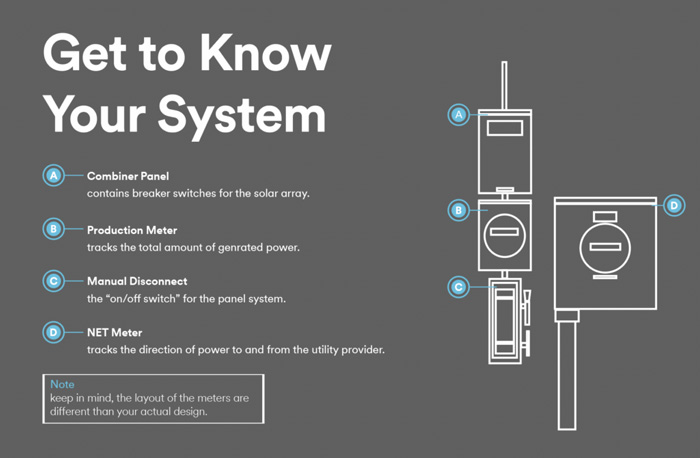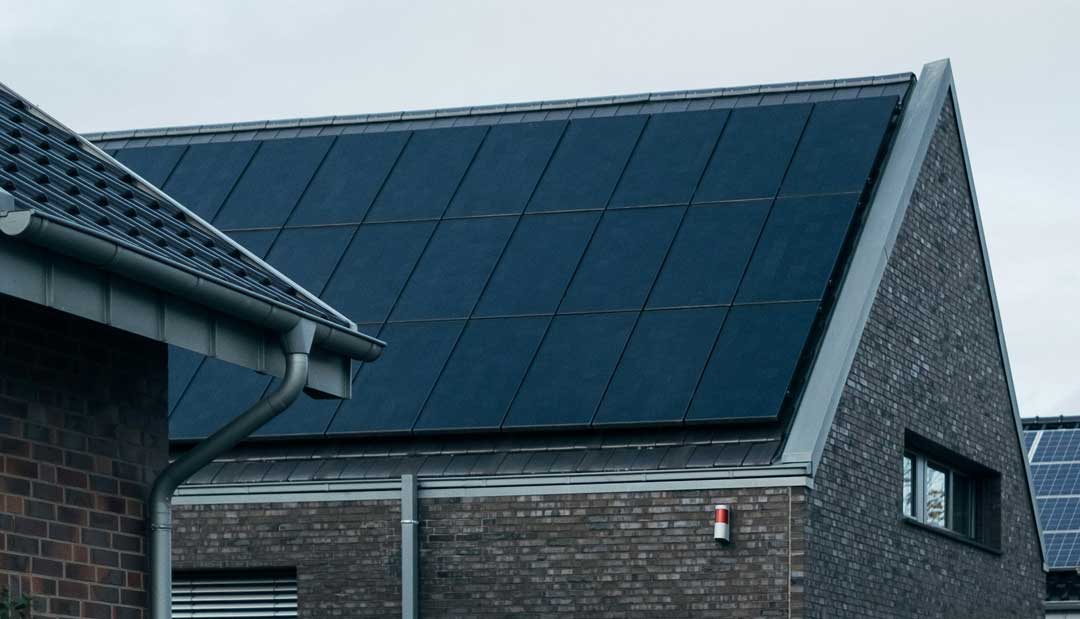Congratulations on investing in a Purelight Solar Energy System!
Now that you’re generating clean, renewable energy right on your roof (or in your yard) you’re probably curious about the different parts of your system.
To help you feel familiar and confident in having solar at home, we’ve prepared a quick guide that walks you through each section of your system, and how everything works.
Keep reading as we go through everything from panels to production meter, and hit on a few key points to having your solar work at maximum efficiency.
Your Solar Energy System from Purelight
Let’s start with the part of your system that you’re already most familiar with: your panels.
Solar Panels
Those glossy, black pieces of glass, metal, and silicon are photovoltaic (PV) solar panels. Meaning they convert UV light into electricity via a chemical reaction.
While they may not look like it, your solar panels are created to withstand extreme weather, a lot of force, and even hail.
For instance, the panels Purelight Power uses are rated to work from -40 degrees fahrenheit all the way up to 185 degrees. They can also withstand winds over 100 miles per hour, and more than 110 lbs of snow per square foot!
And hail? Solar panels are designed to withstand damage from hail up to an inch in diameter falling at up to 50 MPH.
Inverters
In order for your panels to connect into your home’s electrical system, they need to be connected to something called an inverter. That little black box helps to transfer the energy created by the solar panels from DC (direct current) to AC (alternating current).
When you go solar with Purelight Power, you’ll have Enphase inverters installed, which are considered the leading option for solar inverter tech.
Your Solar Electrical System

We’ve covered the part of your solar energy system that’s roof-side, now let’s look at the system that you’ll see installed near your home’s main electrical panel and meter.
Combiner Panel
Inside your combiner panel are breakers which control different sections of your solar energy system. How many will depend on the size of your system.
Combiners do what it says on the box: they’re the space where multiple wires from each series of panels come together to be connected to the rest of the electrical system for your solar. It also helps protect your solar energy system in the event of a power surge, or another electrical issue.
If you’re noticing that a whole section of your solar energy system is showing panels offline on the monitoring app, your first step should be to check the combiner panel.
If a breaker is flipped, it may be as simple as turning it back to the on position to bring your system back online.
Production Meter
The production meter is pretty straightforward: it tracks the lifetime production of your solar energy system in kilowatt hours. When the meter is installed it will start at zero, and with every kilowatt hour your solar panels generate of electricity will count up.
Manual Disconnect
The manual disconnect is basically a really big switch. It’s used to turn the whole system off all at once.
This is important for homeowners who have a generator switch installed alongside their solar panels. Making sure that you turn the manual disconnect to the off position allows you to switch your home’s energy to the back-up generator, and keeps you from sending any power back onto the grid while it’s down and being worked on.
During power outages, the manual disconnect switch will stay in the on position. It’s not a breaker. If there is an electrical issue that heads through the electrical grid and towards your home, the fuses on this section of the system may blow and shut down the connection.
Net Meter
Finally is the net meter. This meter is usually installed near to your normal electrical meter. Except, unlike that meter, it doesn’t track how much energy you’re using.
Instead, it tracks the energy you’re sending back onto the grid when your solar energy system produces more than your home can use right at that moment.
In Oregon, Iowa, and Montana, homeowners who go solar receive a credit for every kilowatt of energy they generate that’s sent back to the grid.
Those credits are shown on your monthly bill from the power company, and can be used to cover times when your solar energy system can’t produce energy. Like at night, or during a winter storm.
Every state has different rules about net metering, and even different power companies handle it differently, so be sure to check in with the utility provider for your home to find out specifics.
Post-Installation Support for Your Solar Energy System
Don’t worry if you’re still getting to know your solar energy system. When you go solar with Purelight, you’re also receiving access to support from our team of solar professionals.
If you ever have a question, concern, or just need some clarification, you can reach out to our Support team at support@purelightpower.com or at 541-200-2896.





